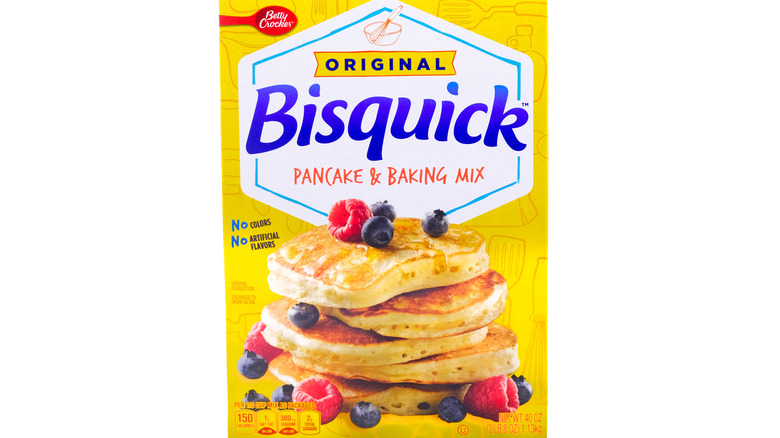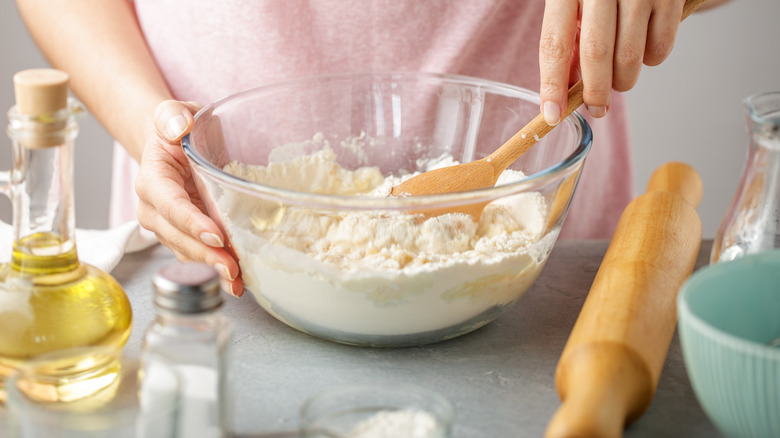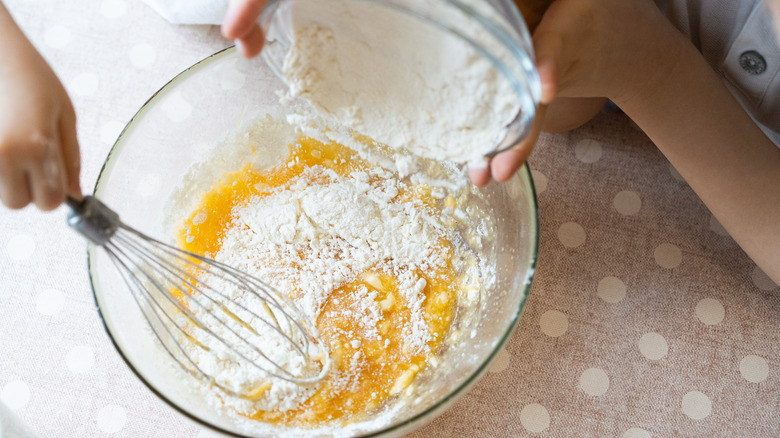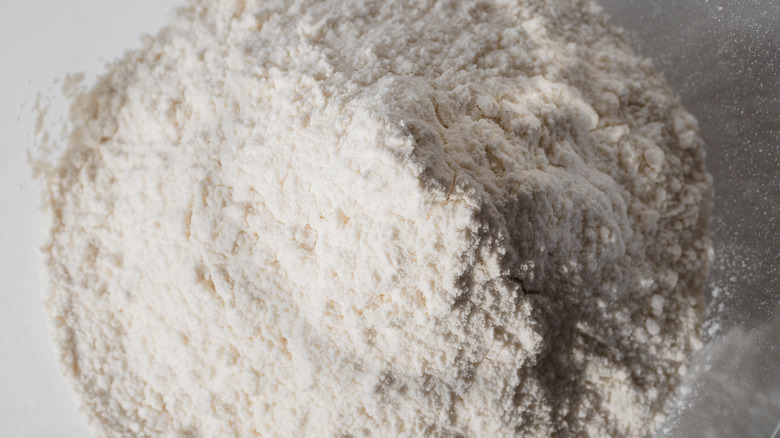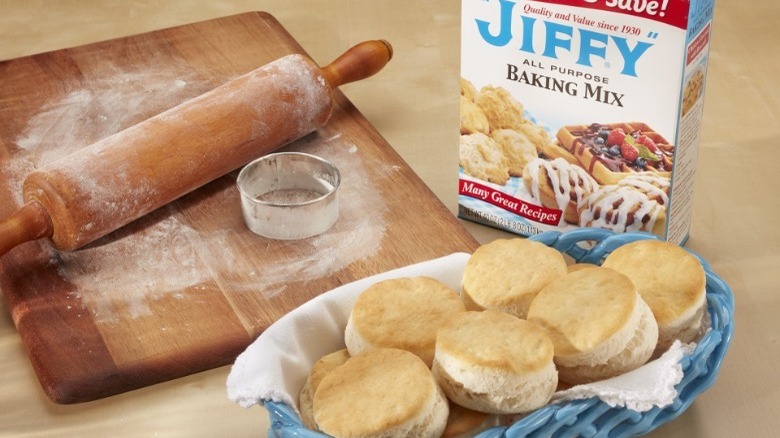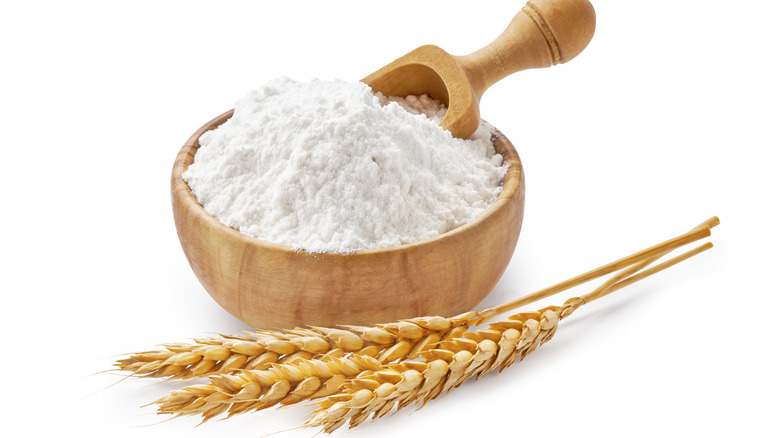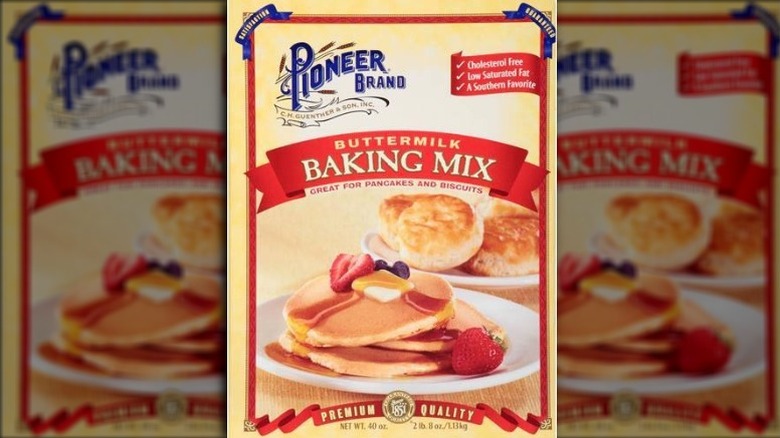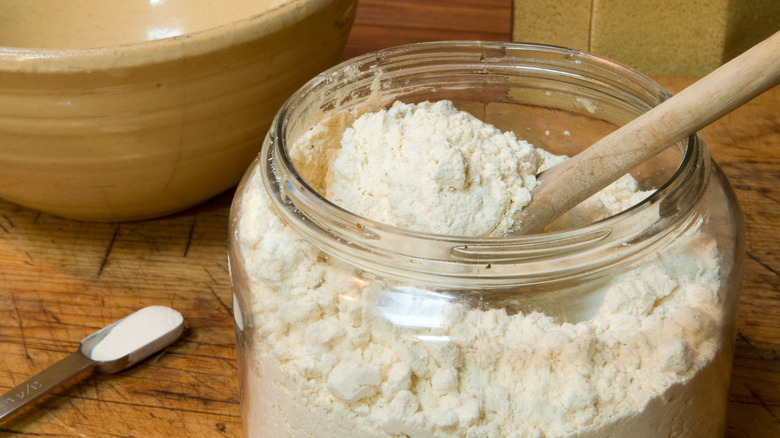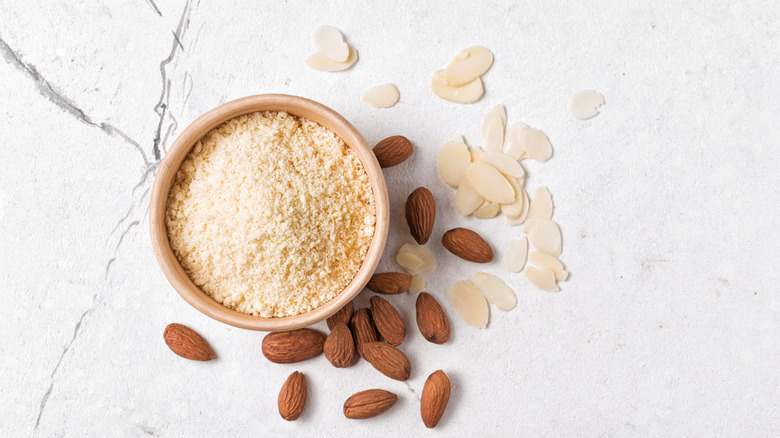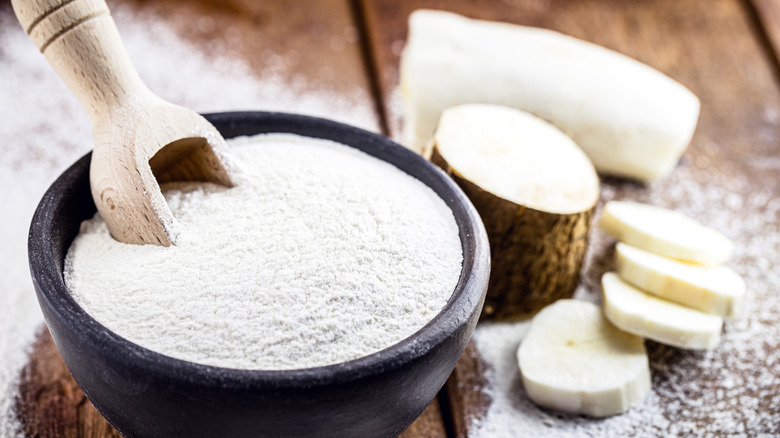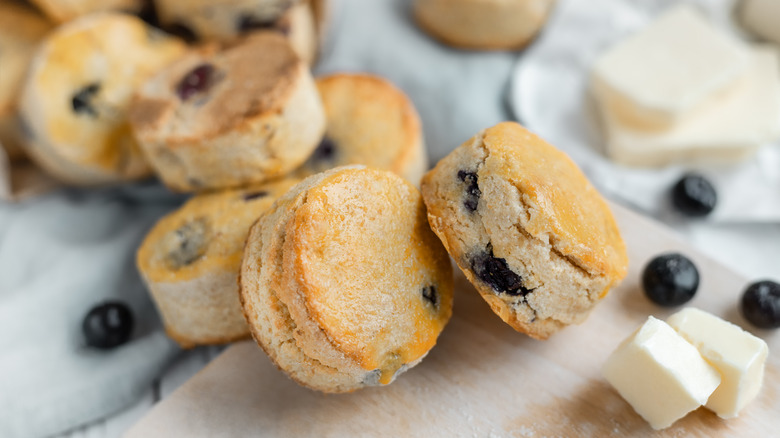10 Best Substitutes For Bisquick
We may receive a commission on purchases made from links.
When you set your sights on making fluffy buttermilk biscuits under a blanket of gravy, or a buttery crumb cake, or sticky fruit cobbler, it can be a real disappointment when you realize you're missing one of the main ingredients. Delicious, flaky recipes like these rely heavily on flour, leavening, and shortening — aka the key components of Bisquick. And if your pantry is devoid of a package of this versatile mix, you might think all is lost, but the good news is there are some suitable substitutes.
First, it may be helpful to know what Bisquick actually is. According to the label, Bisquick is a blend of enriched bleached flour, vegetable oil, corn starch, dextrose, leavening, salt, sugar, DATEM (an emulsifier used to strengthen gluten), and monoglycerides (per Betty Crocker).
Because it combines all of these useful ingredients in one box, Bisquick is often used as a convenient shortcut in baking (hence the 'quick' in its name). When using Bisquick to make biscuits, pancakes, waffles, and other baked treats, you often just need just milk and eggs to finish the batter. But if you run out, don't fret. Thankfully there are other swaps for Bisquick that do the job just fine.
1. DIY Bisquick
Since Bisquick is a mix of several different ingredients, you could always just combine those ingredients yourself to achieve the same product. All Recipes states to make a DIY version, for every 1 cup of Bisquick, simply mix together 1 cup of flour, 1-1/2 teaspoons of baking powder, 1/4 teaspoon of salt, and 1 tablespoon of chilled butter. Then, prepare the mix by sifting the flour into a bowl, and whisk in the baking powder and salt until fully combined. Then, using a pastry cutter, work the butter into the flour mixture until the mixture resembles fine crumbs.
Kitchen Dreaming shares a similar rundown for a suitable homemade Bisquick substitution, but states that you may use vegetable oil or melted butter for the tablespoon of fat. In their recipe, all ingredients are combined in a bowl at the same time and blended with two forks or a pastry cutter.
The blog Tastes of Lizzy T further points out that if you're using butter, you need to store your homemade baking mix in an airtight container in the refrigerator and use it up within four months. If you want a more shelf-stable mix that lasts longer, the site recommends using vegetable shortening or lard instead.
2. Pancake Mix
According to Livestrong, most pancake mixes contain a similar blend of ingredients compared to Bisquick — such as all-purpose flour, a leavening agent (baking soda or baking powder), salt, and hydrogenated oil. Some also contain sugar, making it sweeter than their Bisquick cousin. If you have one with added sugar, it's probably best to swap it in when baking things like sweet breads, muffins, and scones. If your dish is savory, you can also counter the sweetness with opposing flavors, like adding in something tangy, salty, or spicy.
When using pancake mix to make biscuits and dough for pizza or bread, Thriftyfun notes that you may need to cut back on the amount of liquid called for in the recipe in order to get the same kind of sticky, shapeable dough. Start by using half of the liquid called for in the recipe and add on slowly if needed. And for a bigger "rise," which will yield fluffier biscuits and chewier pizza crust, add an additional 1/2 to 1 teaspoon of baking powder. Otherwise you can use it as a direct 1:1 swap.
3. Self-Rising Flour
Self-rising flour also contains most of the same ingredients as Bisquick — i.e. flour, salt, and baking powder. What's missing is the extra additives and vegetable oil. You can substitute self-rising flour for Bisquick in a 1:1 ratio, but note that you'll need to add 1 tablespoon of shortening for every 1 cup of flour (per Cooking Stack Exchange).
Best of Culinary adds that Bisquick contains sugar, so if you're using self-rising flour to replace Bisquick in sweet recipes, you also need to add 1-3/4 teaspoons of sugar for every 1 cup of flour.
Foods Guy also says that, because the two products are very similar, they're called for in many of the same types of recipes. That being said, because of the lack of vegetable shortening, swapping in self-rising flour for Bisquick — without changing anything else — can greatly alter the outcome of your recipe. Remember to add 1 tablespoon of oil, shortening, or butter to each cup of self-rising flour to ensure the success of your final dish.
4. Jiffy Baking Mix
Another shortcut in the kitchen is Jiffy, a line of baking mixes similarly designed to streamline meal and baking preparation. There are different Jiffy mixes for corn muffins, fruit muffins, cakes, brownies, pie crusts, pizza crusts, pancakes/waffles, and buttermilk biscuits, plus an all-purpose baking mix (as seen on the official website). Note, it's the latter three mixes that will work well in place of Bisquick. The pancake/waffle mix consists of flour, sugar, lard, and baking soda, plus a host of additives and flavorings. You can use this in a 1:1 swap for Bisquick, but note that this mix is sweeter and boasts nuances of maple syrup.
The Jiffy buttermilk biscuit mix is likewise pretty similar to Bisquick and you may substitute it 1:1 as well. However, this mix contains preservatives that won't be found in a substitute made from scratch. Jiffy's all-purpose baking mix is also similar to Bisquick but contains a "milk replacer blend," which is important to consider if you're avoiding dairy. With only a small amount of dextrose added, this latter mix works in a variety of sweet and savory recipes alike and can be substituted in a 1:1 ratio too.
5. Cake Flour
Cake flour is a wheat-based, bleached, fine-milled, low protein flour that's meant to produce light, airy cakes. The consistency is very fine, and it has about 3% less protein than all-purpose flour. The protein content is important as it plays an essential role in baking — namely, the higher the protein, the higher the gluten formation and texture of the final product (a quality that's desirable in baked goods like breads). Lower protein flours, like cake flour, produce less gluten, which is ideal for baked treats you want to be softer and fluffier, like biscuits and cake, says Sally's Baking Addiction.
According to The Kitchn, cake flour can be substituted in a 1:1 swap for all-purpose flour in most baking recipes. That means you still need to add your leavening agent, fat, and a little salt to mimic the qualities of Bisquick, though.
Just remember that cake flour is finely milled and will have a much lighter texture than Bisquick.
6. Pioneer Baking Mix
The brand Pioneer has been milling their own flour since 1851, and the Texas-based company offers a wide variety of products, from their original baking mix to buttermilk-enhanced mixes, options for corn muffins and corn bread, whole grain pancake and waffle mix, and pancake/waffle combo mixes scented with pumpkin spice, maple syrup, and sweet cream (per the official website).
Many varieties contain a long list of ingredients, but the Simple Ingredients Baking Mix contains just unbleached wheat flour, palm oil, whey, salt, baking soda, sodium aluminum phosphate (leavening), sugar, and buttermilk. As such, this simple mix can be substituted for Bisquick in a 1:1 ratio, and works well in all types of dishes, from biscuits, pancakes, waffles, and cobblers to dumplings and pot pies.
Pioneer's Original Baking Mix is also a fine choice, but since it contains sugar and corn syrup solids, it will be sweeter than Bisquick, which is something to consider when contemplating the taste of your final dish. The Original Baking Mix can also be swapped 1:1 for Bisquick.
7. Gluten-Free Baking Mix
If gluten-free baking is your ultimate goal, the good news is a gluten-free mix can be used in place of Bisquick. Brands vary, but most contain some combination of rice flour, tapioca and/or potato starch, cellulose, baking powder, salt, and xanthan gum (via King Arthur). It's this combination that helps the blend mimic a wheat flour-based mix, and most varieties can be used to create scrumptious pancakes, fluffy waffles, tender coffee cakes, and buttery biscuits.
In most cases, a gluten-free baking mix can be substituted 1:1 for Bisquick, but note these mixes do not contain fat like Bisquick, so you'll need to add your fat of choice, whether it be butter, lard, vegetable oil, or shortening. Tip: For each cup of baking mix, add 1 tablespoon of fat.
If you want to create a gluten-free Bisquick mix from scratch, Gluten Free Baking shares a recipe that includes ground white rice flour, tapioca starch, granulated sugar, baking powder, salt, xanthan gum, and solid vegetable shortening. This homemade mix can be substituted for Bisquick in a 1:1 swap and there is no need to add additional fat with this option.
8. Almond Flour
Almond flour is simply almonds that are ground into a fine, powdery consistency. Blanched almond flour is most often used for baking because the nuts have been skinned, blanched, and ground, which yields a lighter ingredient that's suitable for baked goods like cookies, scones, cakes, biscuits, and muffins (per Good for you Gluten Free). And it's good to note this is not the same as almond meal, which is much denser.
Almond flour is an excellent, gluten-free alternative to regular flour and can be mixed with other ingredients to create a Bisquick-like all-purpose mix. There's just a little more tweaking involved. For example, when portioning out, it's best not to pack the measuring cup with almond flour, it should be measured loosely. And for every 1 cup of Bisquick, you'll want to substitute a mix of 3/4 cup of almond flour, 1-1/2 teaspoons baking powder, 1/4 teaspoon salt, and 1 tablespoon of fat — this combination can be used in a 1:1 ratio.
Consider adding a binder as well, like xanthan gum, guar gum, or psyllium husk (this will work to replace gluten's role of binding ingredients together). Almond flour bakes faster than regular flour, so you'll also want to lower your oven's cooking temperature by 25 degrees and reduce the recipe's cooking time by 25%.
9. Cassava Flour
Also known as yuca, cassava is a starchy root vegetable native to South America (via Healthline). It's gluten-free, grain-free, and nut-free, and as such, it's a great option for anyone with multiple food allergies. When ground into flour, cassava is light and mild-tasting and can be substituted for all-purpose flour at a ratio of 1:1. But, you still need to add 1-1/2 teaspoons of baking powder, 1/4 teaspoon of salt, and 1 tablespoon of fat to create a mix that resembles Bisquick.
An important distinction, Downshiftology points out that cassava flour is not the same as tapioca flour – although the terms are sometimes used interchangeably. Tapioca is the starch from the cassava root. It's transformed into tapioca flour when the pulp from the root is squeezed to extract a starchy liquid, which ultimately evaporates, leaving tapioca flour behind.
Cassava flour, on the other hand, is the whole root that's been peeled, dried, and ground — and the result is a soft and powdery flour that's most like wheat flour, making it an excellent substitute for Bisquick when leavening and fat are added.
10. Keto Biscuit Mix
For low-carb baking, keto biscuit mix is a great option usually made up of a mix of almond flour or coconut flour, oat fiber, baking powder, natural flavor, and Himalayan pink salt. All ingredients are non-GMO, and the baking powder is aluminum-free. With this particular mix, it can be substituted for Bisquick in a 1:1 swap, as long as you add 1 tablespoon of fat per cup of mix. Note that this option is unsweetened and works best in savory recipes and for making biscuits.
The Keto Bakes Golden Waffles and Pancakes Mix contains similar ingredients, plus grass-fed collagen, butter flavor, and xanthan gum, making it better suited for baking projects where you want the final result to be light and fluffy. You can substitute this mix for Bisquick 1:1, but add 1 tablespoon of fat here too.
Carbquick Complete Biscuit and Baking mix is another option for successful low-carb baking. Made with carbalose flour (a signature blend), the mix is high in protein and fiber, low in sodium, and devoid of sugar, hydrogenated oils, and trans fats (per Amazon). Carbquick can be substituted for Bisquick at a ratio of 1:1.
